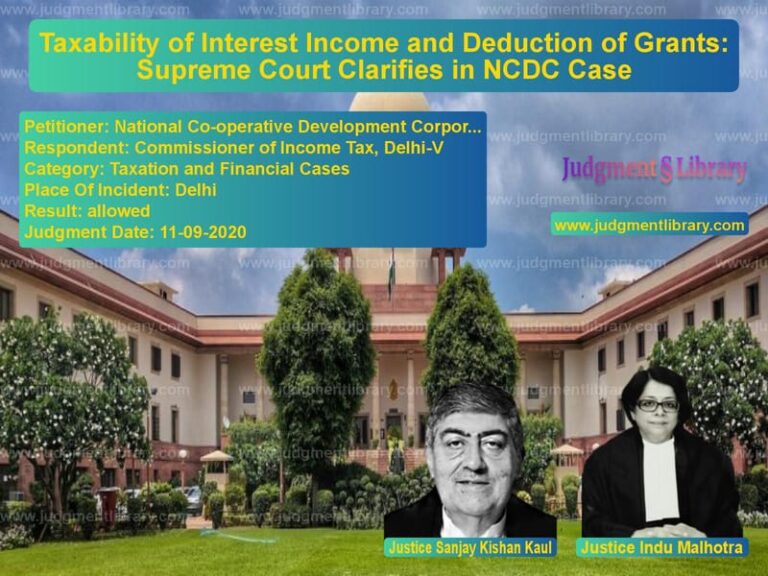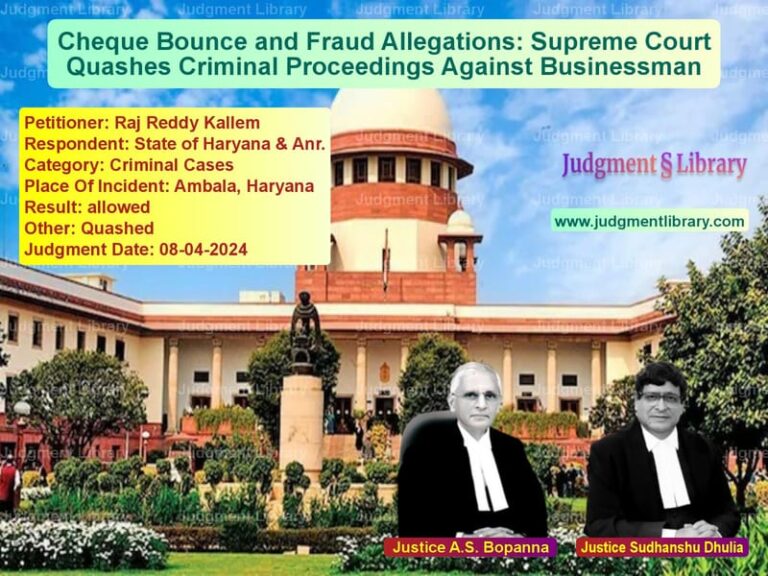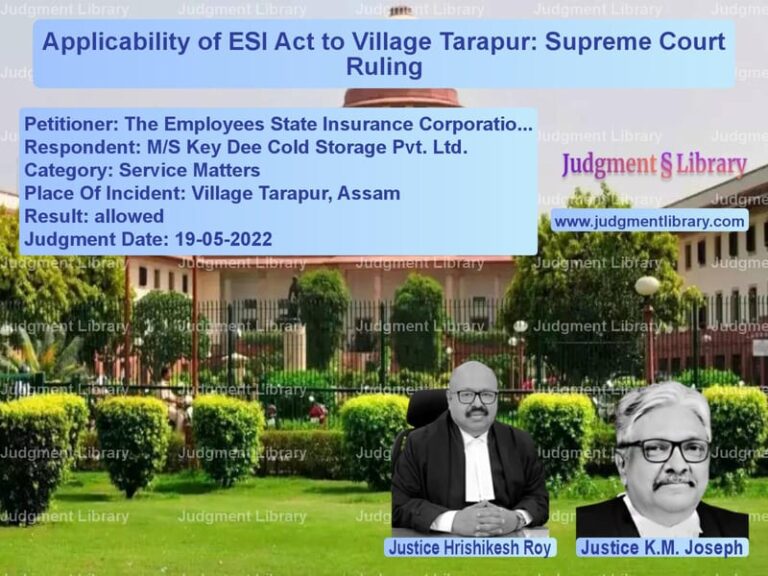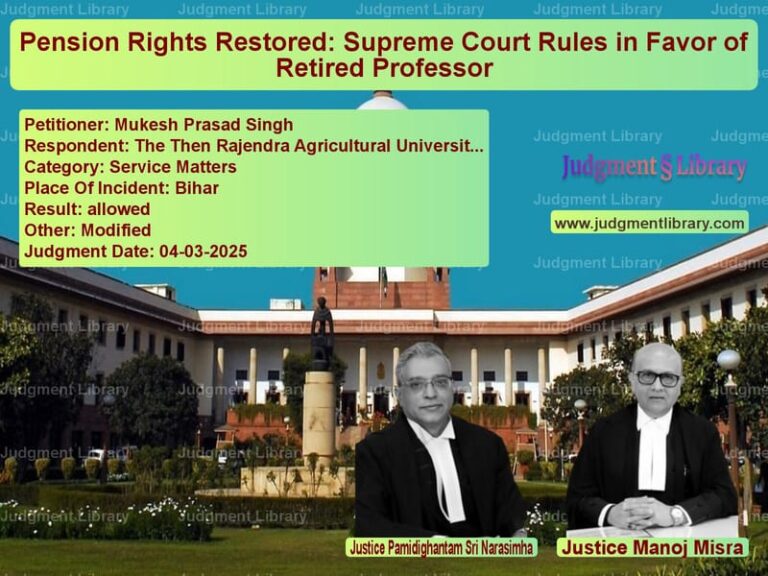Supreme Court Rules on Pension Eligibility for Gramin Dak Sevaks
On November 8, 2019, the Supreme Court of India delivered a crucial judgment in the case of Union of India & Ors. vs. Gandiba Behera, along with multiple connected appeals. The primary issue was whether the service rendered by employees as Gramin Dak Sevaks (GDS) in the postal department could be counted towards the qualifying service required for pension after they transitioned to regular posts. The Court ruled against the inclusion of GDS service for pension calculations but directed the government to consider relaxation under Rule 88 of the Central Civil Services (Pension) Rules, 1972.
Background of the Case
Several former Gramin Dak Sevaks who later secured regular employment in the postal department had their pension claims denied. The government maintained that their service as GDS could not be counted towards the qualifying service period of ten years required under the 1972 Pension Rules.
Aggrieved, the respondents approached the Central Administrative Tribunal (CAT), which ruled in their favor. The High Courts upheld the Tribunal’s decision, leading to the present appeals before the Supreme Court.
Key Legal Issues
The Supreme Court examined the following key legal questions:
- Whether service rendered as Gramin Dak Sevaks could be considered for pension eligibility.
- Whether there was any legal precedent supporting the computation of GDS tenure as qualifying service.
- Whether pension benefits could be extended on humanitarian grounds.
Arguments of the Appellant (Union of India)
The government contended that:
- GDS employees were engaged for limited hours per day and had no formal appointment to regular government posts.
- The 2011 Gramin Dak Sevak (Conduct and Engagement) Rules clearly specified that GDS employees were not entitled to a pension but were eligible for ex-gratia gratuity.
- There was no provision under the 1972 Pension Rules to include GDS tenure in calculating pension eligibility.
- Previous Supreme Court rulings had held that GDS employees did not enjoy the same benefits as regular government employees.
Arguments of the Respondents (GDS Employees)
The respondents contended that:
- They had dedicated decades of service to the postal department before transitioning to regular employment.
- GDS employees performed critical government functions and should not be denied pension rights arbitrarily.
- The principle of promissory estoppel should apply, as they had a legitimate expectation of pension benefits.
- The courts should adopt a humane approach in interpreting service rules.
Supreme Court’s Observations
1. Applicability of the 1972 Pension Rules
The Supreme Court held that the 1972 Pension Rules explicitly required a minimum of ten years of regular service for pension eligibility. Since GDS service was governed by separate rules, it could not be counted towards the qualifying service period.
“There is no provision under the law that allows the inclusion of GDS tenure for calculating pension under the Central Civil Services (Pension) Rules, 1972.”
2. Classification of Gramin Dak Sevaks
The Court reiterated previous rulings that GDS employees held civil posts but were not regular government employees.
“The nature of employment as GDS does not create a vested right to pension under the existing rules.”
3. Consideration of Rule 88 for Humanitarian Grounds
The Court acknowledged that many respondents had marginally fallen short of the ten-year threshold. It directed the government to consider relaxation under Rule 88, which allows for exceptions in cases of undue hardship.
“The government must consider individual cases where undue hardship is caused and exercise its power of relaxation under Rule 88 of the 1972 Pension Rules.”
Final Judgment
The Supreme Court ruled:
- The appeals of the Union of India were allowed, and the High Court orders were set aside.
- GDS service could not be counted towards the qualifying service for pension under the 1972 Pension Rules.
- The government was directed to assess individual cases under Rule 88 to grant relaxation where justified.
Legal Implications of the Judgment
The ruling has significant implications for GDS employees:
- Clarification on Pension Eligibility: The judgment confirms that GDS employees transitioning to regular posts must complete ten years of service to qualify for a pension.
- Potential Policy Reforms: The government may review pension policies for GDS employees in light of the Court’s recommendation to consider Rule 88 applications.
- Judicial Approach to Service Disputes: The decision underscores the Supreme Court’s preference for statutory compliance while allowing for humanitarian relief through administrative discretion.
Conclusion
The Supreme Court’s decision in Union of India vs. Gandiba Behera settles a long-standing dispute regarding GDS pension eligibility. While denying automatic inclusion of GDS service in pension calculations, the ruling ensures that cases of genuine hardship are examined under Rule 88. This balanced approach upholds the rule of law while acknowledging the contributions of long-serving postal employees.
Petitioner Name: Union of India & Ors..Respondent Name: Gandiba Behera.Judgment By: Justice Ranjan Gogoi, Justice Deepak Gupta, Justice Aniruddha Bose.Place Of Incident: India.Judgment Date: 08-11-2019.
Don’t miss out on the full details! Download the complete judgment in PDF format below and gain valuable insights instantly!
Download Judgment: Union of India & Ors vs Gandiba Behera Supreme Court of India Judgment Dated 08-11-2019.pdf
Direct Downlaod Judgment: Direct downlaod this Judgment
See all petitions in Pension and Gratuity
See all petitions in Public Sector Employees
See all petitions in Recruitment Policies
See all petitions in Judgment by Ranjan Gogoi
See all petitions in Judgment by Deepak Gupta
See all petitions in Judgment by Aniruddha Bose
See all petitions in allowed
See all petitions in Modified
See all petitions in supreme court of India judgments November 2019
See all petitions in 2019 judgments
See all posts in Service Matters Category
See all allowed petitions in Service Matters Category
See all Dismissed petitions in Service Matters Category
See all partially allowed petitions in Service Matters Category







